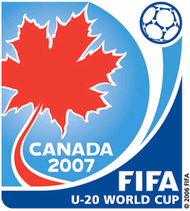2007 FIFA U-20 World Cup
| FIFA U-20 World Cup Canada 2007 Coupe du Monde de Football des Moins de 20 ans 2007 | |
|---|---|
|
2007 FIFA U-20 World Cup official logo | |
| Tournament details | |
| Host country | Canada |
| Dates | 30 June – 22 July |
| Teams | 24 (from 6 confederations) |
| Venue(s) | 6 (in 6 host cities) |
| Final positions | |
| Champions |
|
| Runners-up |
|
| Third place |
|
| Fourth place |
|
| Tournament statistics | |
| Matches played | 52 |
| Goals scored | 135 (2.6 per match) |
| Attendance | 1,195,299 (22,987 per match) |
| Top scorer(s) |
|
| Best player |
|
The 2007 FIFA U-20 World Cup was the sixteenth edition of the FIFA U-20 World Cup (formerly called FIFA World Youth Championship), hosted by Canada from 30 June to 22 July 2007. Argentina defeated Czech Republic in the title game by the score of 2–1, thus managing a back-to-back world title, its fifth in the past seven editions, and sixth overall. Argentine player Sergio Agüero was given the FIFA U-20 Golden Shoe (top scorer, with six goals) and the FIFA U-20 Golden Ball (best player of the tournament), while Japan earned the FIFA Fair Play Award.
The tournament featured 24 teams coming from six continental confederations; Canada qualified automatically as hosts, while the remaining teams qualified based on their rankings at the respective continental U-20 (U-19 in Europe's case) tournaments. UEFA (Europe) qualified six teams; AFC (Asia), CAF (Africa), CONCACAF (North, Central America and Caribbean) and CONMEBOL (South America) four teams each; and OFC (Oceania) one team.
The tournament took place in a variety of venues across the country – Toronto, Edmonton, Montreal, Ottawa, Victoria and Burnaby (Vancouver) – with the showcase stadium being Toronto's new National Soccer Stadium[1] where the final match was held.
On 28 June 2007, two days before the inaugural match, it was reported that 950,000 tickets had been sold,[2] making it the largest single-sport event ever taking place in the country,[3] and on 3 July, the tournament organisers sold the millionth ticket.[4] On 19 July, the semifinal match between Chile and Argentina marked this edition as the most attended in the tournament's history, with an accumulated attendance of 1,156,187 spectators, surpassing Mexico 1983's 1,155,160 spectators.[5] Final attendance totalled 1,195,299.
Venues
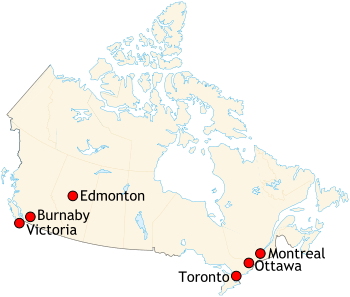 |
Victoria | Burnaby | Edmonton |
|---|---|---|---|
| Royal Athletic Park | Swangard Stadium | Commonwealth Stadium | |
| Capacity: 14,500 | Capacity: 10,000 | Capacity: 60,081 | |
| 48°25′52.6″N 123°21′14.6″W / 48.431278°N 123.354056°W | 49°13′51.0″N 123°01′17.0″W / 49.230833°N 123.021389°W | 53°33′34.6″N 113°28′34.2″W / 53.559611°N 113.476167°W | |
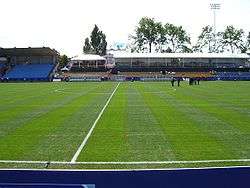 |
 |
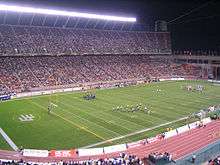 | |
| Toronto | Ottawa | Montreal | |
| National Soccer Stadium | Frank Clair Stadium | Olympic Stadium | |
| Capacity: 20,195 | Capacity: 26,559 | Capacity: 66,308 | |
| 43°37′59.5″N 79°25′06.8″W / 43.633194°N 79.418556°W | 45°23′55.8″N 75°41′03.6″W / 45.398833°N 75.684333°W | 45°33′28.8″N 73°33′07.2″W / 45.558000°N 73.552000°W | |
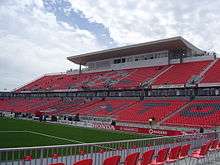 |
 |
 |
Qualification
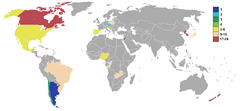
Twenty-three teams qualified for the 2007 FIFA U-20 World Cup. As the host team, Canada received an automatic bid, bringing the total number of teams to twenty-four for the tournament. The draw for the group stages took place on 3 March 2007 in Liberty Grand Entertainment Complex, Toronto.
- 1.^ Teams that made their debut.
Match officials
| Confederation | Referee | Assistants |
|---|---|---|
| AFC | Subkhiddin Mohd Salleh (Malaysia) | Thanom Borikut (Thailand) Mu Yuxin (China) |
| Ravshan Irmatov (Uzbekistan) | Abdukhamidullo Rasulov (Uzbekistan) Bahadyr Kochkarov (Kyrgyzstan) | |
| CAF | Mohamed Benouza (Algeria) | Amar Talbi (Algeria) Mazari Kerai (Algeria) |
| CONCACAF | Steven Depiero (Canada) | Héctor Vergara (Canada) Joe Fletcher (Canada) |
| Joel Aguilar (El Salvador) | Roberto Giron (Honduras) Daniel Williamson (Panama) | |
| Germán Arredondo (Mexico) | Héctor Delgadillo (Mexico) Francisco Pérez (Mexico) | |
| Enrico Wijngaarde (Suriname) | Anthony Garwood (Jamaica) Ricardo Morgan (Jamaica) | |
| Terry Vaughn (United States) | Chris Strickland (United States) George Gansner (United States) | |
| CONMEBOL | Hernando Buitrago (Colombia) | Abraham González (Colombia) Rafael Rivas (Colombia) |
| OFC | Peter O'Leary (New Zealand) | Brent Best (New Zealand) Kaloata Chilia (Vanuatu) |
| UEFA | Howard Webb (England) | Mike Mullarkey (England) Darren Cann (England) |
| Wolfgang Stark (Germany) | Jan-Hendrik Salver (Germany) Volker Wezel (Germany) | |
| Viktor Kassai (Hungary) | Gábor Erős (Hungary) Tibor Vámos (Hungary) | |
| Alberto Undiano Mallenco (Spain) | Fermín Martínez Ibáñez (Spain) Juan Carlos Yuste Jiménez (Spain) | |
| Martin Hansson (Sweden) | Stefan Wittberg (Sweden) Henrik Andrén (Sweden) |
Squads
For a list of the squads see 2007 FIFA U-20 World Cup squads
Group stage
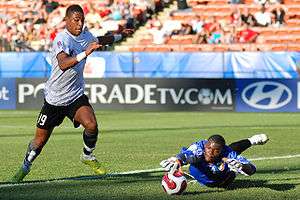
The 24 participating teams were distributed between six groups of four teams each, according to a draw held on 3 March 2007. The groups are contested on a league system, where each team plays one time against the other teams in the same group, for a total of six matches per group. Each group winner and runner-up teams, as well as the best four third-placed teams, qualify for the first round of the knockout stage (round of 16).
| Key to colours in group tables | |
|---|---|
| Group winners, runners-up, and best four third-placed teams advance to the Round of 16 | |
Group A
| Team | Pld | W | D | L | GF | GA | GD | Pts |
|---|---|---|---|---|---|---|---|---|
| 3 | 2 | 1 | 0 | 6 | 0 | +6 | 7 | |
| 3 | 1 | 2 | 0 | 2 | 1 | +1 | 5 | |
| 3 | 1 | 1 | 1 | 3 | 4 | −1 | 4 | |
| 3 | 0 | 0 | 3 | 0 | 6 | −6 | 0 |
Group B
| Team | Pld | W | D | L | GF | GA | GD | Pts |
|---|---|---|---|---|---|---|---|---|
| 3 | 2 | 1 | 0 | 8 | 5 | +3 | 7 | |
| 3 | 1 | 1 | 1 | 4 | 3 | +1 | 4 | |
| 3 | 1 | 1 | 1 | 3 | 4 | −1 | 4 | |
| 3 | 0 | 1 | 2 | 3 | 6 | −3 | 1 |
Group C
| Team | Pld | W | D | L | GF | GA | GD | Pts |
|---|---|---|---|---|---|---|---|---|
| 3 | 3 | 0 | 0 | 7 | 2 | +5 | 9 | |
| 3 | 2 | 0 | 1 | 3 | 4 | −1 | 6 | |
| 3 | 1 | 0 | 2 | 4 | 4 | 0 | 3 | |
| 3 | 0 | 0 | 3 | 1 | 5 | −4 | 0 |
Group D
| Team | Pld | W | D | L | GF | GA | GD | Pts |
|---|---|---|---|---|---|---|---|---|
| 3 | 2 | 1 | 0 | 9 | 3 | +6 | 7 | |
| 3 | 1 | 1 | 1 | 3 | 7 | −4 | 4 | |
| 3 | 1 | 0 | 2 | 4 | 5 | −1 | 3 | |
| 3 | 0 | 2 | 1 | 4 | 5 | −1 | 2 |
Group E
| Team | Pld | W | D | L | GF | GA | GD | Pts |
|---|---|---|---|---|---|---|---|---|
| 3 | 2 | 1 | 0 | 7 | 0 | +7 | 7 | |
| 3 | 1 | 2 | 0 | 4 | 3 | +1 | 5 | |
| 3 | 0 | 2 | 1 | 2 | 3 | −1 | 2 | |
| 3 | 0 | 1 | 2 | 1 | 8 | −7 | 1 |
Group F
| Team | Pld | W | D | L | GF | GA | GD | Pts |
|---|---|---|---|---|---|---|---|---|
| 3 | 2 | 1 | 0 | 4 | 1 | +3 | 7 | |
| 3 | 2 | 1 | 0 | 3 | 0 | +3 | 7 | |
| 3 | 1 | 0 | 2 | 2 | 3 | −1 | 3 | |
| 3 | 0 | 0 | 3 | 2 | 7 | −5 | 0 |
Ranking of third-placed teams
| Group | Team | Pld | W | D | L | GF | GA | GD | Pts |
|---|---|---|---|---|---|---|---|---|---|
| A | 3 | 1 | 1 | 1 | 3 | 4 | −1 | 4 | |
| B | 3 | 1 | 1 | 1 | 3 | 4 | −1 | 4 | |
| C | 3 | 1 | 0 | 2 | 4 | 4 | 0 | 3 | |
| D | 3 | 1 | 0 | 2 | 4 | 5 | −1 | 3 | |
| F | 3 | 1 | 0 | 2 | 2 | 3 | −1 | 3 | |
| E | 3 | 0 | 2 | 1 | 2 | 3 | −1 | 2 |
Knockout stage
| Round of 16 | Quarter-finals | Semi-finals | Final | |||||||||||
| 11 July – Edmonton | ||||||||||||||
| |
2 | |||||||||||||
| 14 July – Toronto | ||||||||||||||
| |
1 | |||||||||||||
| |
2 | |||||||||||||
| 11 July – Toronto | ||||||||||||||
| |
1 | |||||||||||||
| |
2 | |||||||||||||
| 18 July – Edmonton | ||||||||||||||
| |
1 | |||||||||||||
| |
0 | |||||||||||||
| 11 July – Victoria | ||||||||||||||
| |
2 | |||||||||||||
| |
2 (3) | |||||||||||||
| 14 July – Edmonton | ||||||||||||||
| |
2 (4) | |||||||||||||
| |
1 (3) | |||||||||||||
| 11 July – Burnaby | ||||||||||||||
| |
1 (4) | |||||||||||||
| |
4 | |||||||||||||
| 22 July – Toronto | ||||||||||||||
| |
2 | |||||||||||||
| |
1 | |||||||||||||
| 12 July – Edmonton | ||||||||||||||
| |
2 | |||||||||||||
| |
1 | |||||||||||||
| 15 July – Montreal | ||||||||||||||
| |
0 | |||||||||||||
| |
4 | |||||||||||||
| 12 July – Ottawa | ||||||||||||||
| |
0 | |||||||||||||
| |
1 | |||||||||||||
| 19 July – Toronto | ||||||||||||||
| |
2 | |||||||||||||
| |
0 | |||||||||||||
| 12 July – Montreal | ||||||||||||||
| |
3 | Third Place | ||||||||||||
| |
3 | |||||||||||||
| 15 July – Ottawa | 22 July – Toronto | |||||||||||||
| |
0 | |||||||||||||
| |
1 | |
0 | |||||||||||
| 12 July – Toronto | ||||||||||||||
| |
0 | |
1 | |||||||||||
| |
3 | |||||||||||||
| |
1 | |||||||||||||
Round of 16
| Japan |
2–2 (a.e.t.) | |
|---|---|---|
| Makino Morishima |
Report | Kúdela Mareš |
| Penalties | ||
| Yasuda Aoki Makino Morishima Kashiwagi |
3–4 | |
Quarter-finals
| Spain |
1–1 (a.e.t.) | |
|---|---|---|
| Mata |
Report | Kalouda |
| Penalties | ||
| Mata Adrián G. Valiente J. García Piqué |
3–4 | |
Semi-finals
Match for third place
Final
Goalscorers
- 6 goals
- 5 goals
- 4 goals
- 3 goals
- 2 goals
- 1 goal
|
- 1 own goal
-
 Mathias Cardaccio (playing against United States)
Mathias Cardaccio (playing against United States)
Awards
| Golden Ball | Silver Ball | Bronze Ball |
|---|---|---|
| Golden Shoe | Silver Shoe | Bronze Shoe |
| FIFA Fair Play Award | ||
Final ranking
| Rank | Team | Pld | W | D | L | GF | GA | GD | Pts | |
|---|---|---|---|---|---|---|---|---|---|---|
| 1 | 7 | 6 | 1 | 0 | 16 | 2 | +14 | 19 | ||
| 2 | 7 | 2 | 4 | 1 | 10 | 7 | +3 | 10 | ||
| 3 | 7 | 5 | 1 | 1 | 12 | 3 | +9 | 16 | ||
| 4 | 7 | 3 | 2 | 2 | 6 | 6 | 0 | 11 | ||
| Eliminated in the quarter-finals | ||||||||||
| 5 | 5 | 4 | 0 | 1 | 10 | 3 | +7 | 12 | ||
| 6 | 5 | 3 | 2 | 0 | 13 | 8 | +5 | 11 | ||
| 7 | 5 | 3 | 1 | 1 | 12 | 6 | +6 | 10 | ||
| 8 | 5 | 3 | 1 | 1 | 5 | 5 | 0 | 10 | ||
| Eliminated in the Round of 16 | ||||||||||
| 9 | 4 | 2 | 2 | 0 | 6 | 3 | +3 | 8 | ||
| 10 | 4 | 2 | 0 | 2 | 4 | 6 | –2 | 6 | ||
| 11 | 4 | 1 | 1 | 2 | 5 | 5 | 0 | 4 | ||
| 12 | 4 | 1 | 1 | 2 | 5 | 6 | –1 | 4 | ||
| 13 | 4 | 1 | 1 | 2 | 3 | 7 | –4 | 4 | ||
| 14 | 4 | 1 | 1 | 2 | 4 | 10 | –6 | 4 | ||
| 15 | 4 | 1 | 0 | 3 | 4 | 5 | –1 | 3 | ||
| 16 | 4 | 1 | 0 | 3 | 6 | 9 | –3 | 3 | ||
| Eliminated at the group stage | ||||||||||
| 17 | 3 | 1 | 0 | 2 | 2 | 3 | –1 | 3 | ||
| 18 | 3 | 0 | 2 | 1 | 4 | 5 | –1 | 2 | ||
| 19 | 3 | 0 | 2 | 1 | 2 | 3 | –1 | 2 | ||
| 20 | 3 | 0 | 1 | 2 | 3 | 6 | –3 | 1 | ||
| 21 | 3 | 0 | 1 | 2 | 1 | 8 | –7 | 1 | ||
| 22 | 3 | 0 | 0 | 3 | 2 | 7 | –5 | 0 | ||
| 23 | 3 | 0 | 0 | 3 | 1 | 5 | –4 | 0 | ||
| 24 | 3 | 0 | 0 | 3 | 0 | 6 | –6 | 0 | ||
Controversies
Nigerian accusations of racism
The Chile–Nigeria quarter-final match took place on FIFA's "Say No To Racism Day." During extra time, Chile's Mauricio Isla scored at the 96th minute. The Nigerians argued that it was offside, though referee Howard Webb allowed the goal to stand. Replays showed that a defender was caught out of place on an offside trap. Goalkeeper Ikechukwu Ezenwa was shown the yellow card for his protest.[6][7]
At a post-game news conference, Nigerian coach Ladan Bosso said, "What happened on the pitch, the officiating, I think FIFA has a long way to go to beat racism, because that official showed racism." When asked if he felt Webb was a racist, Bosso said only that "It's good for FIFA to bring in the fight against racism, but they have to follow it to the letter, so the implementation will be done."[7] The coach was fined CHF 11,000 and banned for four months, as the disciplinary committee found him guilty of "offensive behaviour" under the terms of article 57 of the FIFA Disciplinary Code.
The Nigerian Football Association was also sanctioned for allowing the players to wear T-shirts with religious statements under their game jerseys. This was a violation of the regulations of the tournament, which state, "Players and officials are not allowed to display political, religious, commercial or personal messages in any language or form on their playing or team kits ..."[6]
Chilean clash with police
On 19 July 2007, there was a very controversial semi-final match between Chile and Argentina. Referee Wolfgang Stark was criticized by the Chilean players for his officiating, having "lost control of the match early"[8] and for issuing seven yellow cards (out of nine players) and two red cards against Chile during the match.[9] In total, he issued 53 fouls, 30 of which he charged to Chile.[10] Chilean striker Nicolás Medina hinted that he felt that the referee was favouring the Argentine team, stating, "Eleven against eleven, the game would have been much more fair."[11] Added to this is the perception that the Argentine players were able to employ "diving" tactics and "theatrics"[11] to influence the referee's calls.
Following the match, Stark and his colleagues were surrounded by livid Chilean players that were restrained by members of the Toronto Police Service. Stark then had to be escorted off of the pitch and into the dressing room tunnel by police officers for fear that he would be attacked by the crowd and/or Chilean players at the National Soccer Stadium.[12]
Afterwards, several players and delegates of the Chilean team were involved in a brawl with police outside Toronto's National Soccer Stadium,[13] which ended with several Chileans injured, then handcuffed and detained inside the stadium. How the events unfolded is not unanimous, with two currently existing versions.
Players' version
According to the Chilean players and some witnesses, at 10:22 p.m. (local time) Chilean player Isaías Peralta – before getting on the team bus – walked towards a crowd of Chilean fans stationed behind a security fence some 50 metres away from the bus, but was stopped by about ten policemen some 30 metres away from the fence. A heated discussion took place, where Peralta (who speaks no English) was verbally and physically abused by the policemen. Peralta was tasered by one police officer and he lost consciousness for 20 minutes. Chilean player Arturo Vidal arrived at the scene to help his teammate and got involved in a struggle with the police. Other eyewitnesses stated it was Chilean goalkeeper Cristopher Toselli who walked towards the fans when he was grabbed by a security guard, prompting the melee.[14] This was noticed by the other players inside the bus, who also got involved in the struggle with the police. All players – except Peralta, who lay unconscious on the ground – got back on the bus and closed the doors to keep the police out. A policewoman noticed this and threw a tear gas canister (or something to that effect) inside the bus. The players panicked and started breaking windows to let air in. Three minutes later the president of the Chilean National Association of Professional Football (ANFP), Harold Mayne-Nicholls, asked the players to descend from the bus to take a different one. As the players were getting off the bus they were violently detained by police; some players were even handcuffed. Alexis Sánchez – who was coming out of the antidoping test – heard some people screaming and arrived at the scene, but was also beaten by police. The police then took the players back to the stadium. Christian Suárez – arriving from the mixed zone – was also detained.[15] Peralta claimed that after he regained consciousness: "I saw 10 police officers were hitting me and throwing acid in my face;"[16] and also claimed the police removed an object the size of a match from his back so the press wouldn't be able to see it.[17] Other Chilean players said to the Chilean press that the Canadian police treated them like criminals, used pepper spray and Tasers on them, threatened them with legal action, and that while they were on the team's dressing room showing each other's wounds, they were laughed at.[15][17] During the Sunday final Mayne-Nicholls – who is also a FIFA official – allegedly identified the policeman who gave the order to use gas on the players and asked him why he had acted that way; Mayne-Nicholls claimed the policeman responded: "We use gas and electricity when we deal with criminals like yours."[18]
Police version
The police version of the events, as given by Toronto Police Chief Bill Blair, claimed that the melee began when Chilean players got into a scuffle with a rival fan.[19] He added that "members of the Chilean team then decided to direct some of their aggressive behaviour towards my officers... The job of my officers was to respond in a firm, but fair, manner to end that violence. They are trained to do so, and that is what they did."[19] According to eyewitness accounts, the players on the bus began throwing things at police through the windows and tried to grab officers from inside the damaged bus.[20] FIFA spokesman John Schumacher said, "The Chilean players were detained by the police to de-escalate the situation that was taking place in front of the stadium."[16]
Eyewitness accounts stated that the altercation began as the Chilean players were heading to their bus, across the driveway from the doors of the stadium. There was apparently yelling near the bus, and then a scuffle erupted. Nathan Denette, in a reported for The Canadian Press, stated, "Next thing you know, the bus just unloads and there's eight, 10 players come off the bus and there's just fists flying everywhere, between the cops, the security guards, a couple of ladies were involved that were security." As the conflict became more heated, a police officer did use a Taser – though it was unclear if it was used on a player or an official with the Chilean team – after which the brawl became even more intense.[16] It was also asserted that any bruises sustained by anyone involved were "tiny."[21]
Press shut-out
The Chilean press alleged that all press were removed from the area by security personnel since the incident's start, threatened with the removal of their tapes if they recorded anything and locked inside a room for several minutes.[22]
Aftermath
Ten Chilean team members were detained over three hours and then released without charges.[23] FIFA president Sepp Blatter said the next day at a press conference in Toronto that the incident was "regrettable" and that he "apologized in the name of FIFA."[24] The ANFP (Chilean Professional Football Association) hired a Toronto law firm to pursue legal action against the Toronto police.[15]
In Chile, the incident was on the front page of every major newspaper. The Canadian embassy in Santiago received a bomb threat and angry Chileans protested outside the embassy with signs reading "Racist Canada."[25] Chile President Michelle Bachelet said that the incident was "especially serious because, in our opinion, the Chilean delegation suffered unjustified aggression,"[24] and lodged a formal protest with the Canadian government.[26] In response, Canadian Prime Minister, Stephen Harper remarked that "international soccer matches are hotly contested and often become very emotional. As you know, there are processes in Canada by which the authorities review these kinds of incidents and I don't intend to comment further."[26]
It was reported in the Canadian media on 30 July 2007 that Isaías Peralta had confessed to Santiago's El Mercurio that one of the Chilean team members had punched a female police office in the face before Peralta had been tasered, but maintained that the Toronto police had assaulted the Chilean team members before they retaliated. The following day, however, Peralta denied making the comments.[27] Police spokesperson Mark Pugash affirmed a female officer had been hit in the face, and stated the Chilean's violent behaviour prompted police to use Tasers and pepper spray, upholding the story that the Chileans had started the mêlée by confronting an Argentine fan.[28] After an internal review headed by Superintendent Jim Ramer – in which witnesses, including event security officials, members of the Ontario Soccer Association, the BMO Field event coordinator, and the driver of the Chilean bus, offered statements – a report issued by the Toronto Police Service on 31 July 2007 found that officers had acted professionally and with "an immense amount of restraint" during the conflict outside BMO Field, in which Chilean players "punched, kicked, spat on and kicked" police and security staff. The report stated that the violence started when two people not involved in the game confronted each other. Security guards first attempted to intervene, and then police, which is when a Chilean player punched a female police officer in the face. From that point, the report said the violence escalated; Chilean players dismantled the armrests and footrests from the bus seats, and smashed the windows in order to spit at and throw these objects, plus D-cell batteries, clothes hangers, and cans of deodorant at the police. Four officers were reportedly injured by projectiles. FIFA agreed to pay for the $35,000 in damages to the team's rented bus.[27]
Harold Mayne-Nicholls, chair of the Football Federation of Chile and a witness to the event, said, "I didn't see any Chilean player hitting any officer except between all the struggling." Patricio Bascunan, president of the Salvador Allende Cultural Society of Toronto, said an independent review was needed.[27]
Disciplinary measures
Chile's Jaime Grondona was suspended for nine months at all levels (domestic and international) and fined CHF 7,000 (including procedural costs) for assaulting match officials. The Chilean football association was fined CHF 15,000 for "team misconduct".
See also
References
- ↑ "National Soccer Stadium" was the temporary name of the BMO Field during this tournament, as FIFA prohibits sponsorship of stadia unless the stadium sponsor is also an official FIFA sponsor.
- ↑ "FIFA U-20 World Cup surpasses 950,000 spectators". CanadaSoccer.com. 28 June 2007. Archived from the original on 27 September 2007. Retrieved 1 July 2007.
- ↑ "History made with Canada 2007 ticket sales". FIFA. 1 March 2007. Archived from the original on 15 July 2007. Retrieved 1 July 2007.
- ↑ "Fast starts for Mexico, Portugal". FIFA.com. 3 July 2007. Retrieved 4 July 2007.
- ↑ "Canada sets U-20 World Cup attendance record". CBC Sports. 20 July 2007. Retrieved 22 July 2007.
- 1 2 "Don't blame the ref". CBC News. Retrieved 29 October 2010.
- 1 2 "Nigerian coach levies racism charge against ref". CBC News. 17 July 2007. Retrieved 29 October 2010.
- ↑ Woolsey, Garth (20 July 2007). "Beautiful game turns ugly". The Star (Toronto). Retrieved 22 April 2010.
- ↑ FIFA.com
- ↑ "Chileans fight with police after loss". CNN (Associated Press). July 20, 2007. Archived from the original on 15 August 2007. Retrieved 25 May 2013.
- 1 2 Argentina dives to finals
- ↑ "Argentina advances to FIFA U-20 final". CBC News. 19 July 2007. Retrieved 29 October 2010.
- ↑ [Reuters: Chile soccer players clash with Toronto police; 20 July 2007]
- ↑ Campbell, Morgan; Toronto Star: CSA seeking witnesses to Chile brawl; 24 July 2007
- 1 2 3 La Tercera 21 July 2007 edition
- 1 2 3 CTV News: Chile officials blame T.O. police for soccer brawl; 20 July 2007
- 1 2 Sub 20: Los jugadores contaron su impactante versión de los hechos", El Mercurio Online, agencias. Retrieved 21 July 2007.
- ↑ "Mayne-Nicholls relató inéditos detalles de golpiza en Canadá" La Tercera. Retrieved 24 July 2007. Archived 10 October 2007 at the Wayback Machine
- 1 2 Chilean officials blame Police for melee, tsn.ca. Retrieved 20 July 2007.
- ↑ "Chile officials say Toronto police to blame for soccer team's post-match brawl" Canadian Press. Retrieved 21 July 2007.
- ↑ [Warmington, Joe; Toronto Sun: Chileans' conduct shameful; 23 July 2007]
- ↑ El Mercurio 20 July 2007 edition
- ↑ La Tercera 22 July 2007 edition.
- 1 2 "Chile football players face FIFA probe after brawl", Reuters. Retrieved 21 July 2007.
- ↑ "Toronto melee a global dust-up", thestar.com. Retrieved 21 July 2007.
- 1 2 Babage, Maria, T.O. cops under scrutiny, Slam.ca, 20 July 2007 Archived 18 August 2007 at the Wayback Machine
- 1 2 3 Powell, Betsy; Dale, Daniel; Toronto Star: Officers cleared in soccer scuffle; 31 July 2007
- ↑ Dale, Daniel; Toronto Star: Chilean player admits officer was punched; 30 July 2007
External links
- FIFA U-20 World Cup Canada 2007, FIFA.com
- RSSSF > FIFA World Youth Championship > 2007
- FIFA Technical Report
| ||||||||||||||||||
